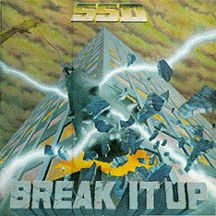| Break It Up | ||||
|---|---|---|---|---|
 | ||||
| Studio album by | ||||
| Released | November 1985 | |||
| Recorded | 1985 | |||
| Genre | Heavy metal | |||
| Length | 43:57 | |||
| Label | Homestead | |||
| Producer | Lou Giordano, SSD | |||
| SSD chronology | ||||
| ||||
| Review scores | |
|---|---|
| Source | Rating |
| AllMusic | |
Break It Up was the fourth and final release from Boston band SSD. It saw the band delve further into the heavy metal genre, leaving behind their punk and hardcore roots.